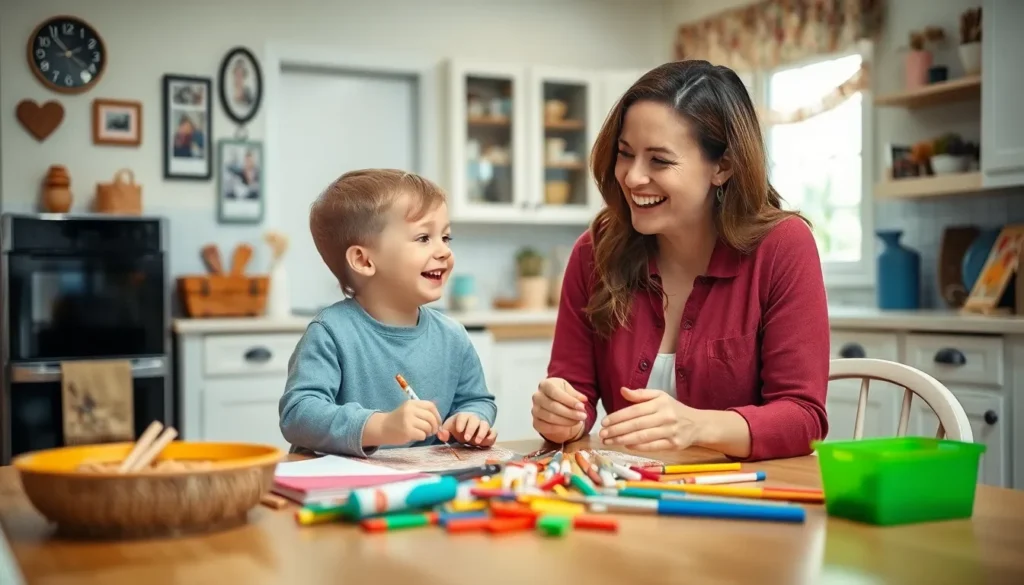Navigating the wild world of parenting can feel like trying to assemble furniture from a popular Swedish store—confusing instructions and missing pieces galore! Every parent knows that raising kids is a mix of joy, chaos, and the occasional desperate search for the last cookie. But fear not, because with the right tips in hand, it’s possible to turn those parenting challenges into delightful adventures.
Table of Contents
ToggleImportance Of Parenting Tips
Parenting tips provide essential guidance for navigating the complexities of raising children. Effective strategies can enhance parenting skills, leading to positive outcomes for both parents and children. These tips can streamline daily routines, making the parenting journey less overwhelming.
Recent studies highlight that structured parenting approaches correlate with improved child behavior. Incorporating consistent tips into daily life fosters a harmonious family environment. Many parents experience stress challenges; having a resource for advice alleviates this pressure.
Frequent communication strengthens the parent-child bond. When parents apply practical tips, they set clear expectations and promote healthy relationships. Research indicates that children thrive in homes with well-defined rules and loving guidance.
Utilizing parenting tips supports child development in crucial stages. Each age brings unique challenges, and tailored advice prepares parents for these evolving needs. Furthermore, valuable resources are plentiful, enabling parents to seek support at any moment.
Exploring various parenting tips can help identify what works best for individual families. Participation in parenting workshops or groups facilitates sharing experiences and insights. As knowledge and skills grow, parents showcase increased confidence in their roles.
Accessing reliable parenting tips supports emotional well-being for parents and children alike. Prioritizing these insights empowers families to cultivate nurturing, supportive environments. Each tip contributes to a more fulfilling parenting experience, enhancing a child’s overall development.
Strategies For Effective Parenting

Effective parenting involves implementing practical strategies that enhance parent-child relationships and promote healthy development.
Setting Clear Boundaries
Setting clear boundaries ensures children understand expectations. Boundaries establish consistency, which fosters a sense of security. Parents should define rules that align with family values and enforce them consistently. Consistent application reinforces the importance of boundaries, helping children feel safe and understood. Encouragement of respectful behavior should accompany these guidelines, allowing children to learn the consequences of their actions. Parents can also involve children in discussions about limits, encouraging a sense of ownership over their behavior. Regular review of boundaries allows them to adapt to developmental changes, ensuring they remain relevant.
Encouraging Open Communication
Open communication promotes trust and understanding between parents and children. Parents should create a space where children feel safe expressing their thoughts and feelings. Active listening is essential; it demonstrates empathy while validating children’s emotions. Children thrive when they know their voices matter. Asking open-ended questions fosters discussion, guiding children to articulate their feelings more clearly. Regularly engaging in conversations about daily experiences strengthens familial bonds. Encouraging honesty helps children understand the importance of sharing their thoughts without fear of judgment. By prioritizing these communication strategies, parents nurture important life skills within their children.
Nurturing Child Development
Nurturing child development involves creating a supportive environment that promotes growth. Parents can implement specific strategies to enhance their children’s skills and well-being.
Fostering Independence
Encouraging independence strengthens self-confidence and resilience in children. Allowing children to make choices fosters decision-making skills. Assigning age-appropriate tasks provides opportunities for responsibility, leading to valuable life skills. Parents can guide their children while giving them the space to explore. For example, involving children in everyday tasks, like preparing meals or managing their own schedules, cultivates a sense of ownership. These practices not only build independence but also enhance problem-solving abilities.
Supporting Emotional Well-Being
Supporting emotional well-being is crucial for healthy development. Open dialogue about feelings promotes emotional intelligence and self-awareness. Parents can model healthy coping strategies, demonstrating how to handle challenges effectively. Participating in activities that encourage self-expression, such as art or journaling, offers children an outlet for their emotions. Additionally, recognizing and validating children’s feelings fosters a secure atmosphere. Establishing routines provides stability, reducing anxiety and creating a sense of security for children. Nurturing these aspects contributes significantly to a child’s overall emotional resilience.
Balancing Discipline And Love
Balancing discipline and love forms a crucial aspect of effective parenting. Establishing clear boundaries helps children understand expectations. When parents enforce rules with love, they foster respect and trust. Consistency in disciplinary actions reinforces these boundaries, promoting security within the family.
Examples abound, showing that children thrive in environments where love accompanies discipline. A loving approach can involve explaining the reasoning behind rules, fostering a sense of understanding. Often, offering choices within established limits empowers children, allowing them to feel in control while respecting boundaries.
Moreover, showing affection during disciplinary moments strengthens emotional connections. A gentle tone and reassuring words can soften corrective feedback, promoting a healthy dialogue about behavior. Encouraging children to express their feelings during these discussions helps develop open communication.
Effective discipline includes recognizing positive behaviors alongside addressing inappropriate ones. Celebrating achievements, no matter how small, nurtures self-esteem and reinforces good actions. When children feel valued for their positive traits, it balances the impact of any corrective measures.
Practicing empathy while enforcing rules benefits overall family dynamics. Understanding a child’s perspective fosters compassion, allowing for more meaningful discussions about behavior. Techniques like active listening during conflicts enable parents to address concerns constructively.
Striving for a blend of love and discipline leads to well-rounded development. Research underscores the importance of this balance, showing that children with supportive and consistent guidance exhibit better behavioral outcomes. Families who prioritize this dynamic cultivate nurturing environments essential for raising emotionally healthy and resilient children.
Parenting is a journey filled with ups and downs that can be navigated more smoothly with the right guidance. By implementing effective strategies and fostering open communication, parents can create nurturing environments that support their children’s growth and development.
Encouraging independence and emotional expression builds resilience and self-confidence in children. Balancing discipline with love ensures that boundaries are respected while maintaining strong familial bonds.
As parents continue to explore various tips and approaches, they not only enhance their skills but also cultivate a harmonious household. This commitment to learning and adapting ultimately leads to healthier relationships and a thriving family dynamic.

